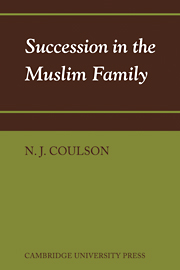Book contents
- Frontmatter
- Contents
- Introduction
- 1 Family ties as grounds of inheritance
- 2 Priorities in inheritance
- 3 Primary heirs
- 4 Substitute heirs
- 5 Secondary heirs
- 6 Grandfather and collaterals in competition
- 7 Succession by the outer family
- 8 Inheritance in Shīʻī law
- 9 Reforms in the traditional system of priorities
- 10 Dual relationships
- 11 Impediments to inheritance
- 12 Conditions of inheritance
- 13 Bequests
- 14 The limits of testamentary power
- 15 Death-sickness
- Index
6 - Grandfather and collaterals in competition
Published online by Cambridge University Press: 30 March 2010
- Frontmatter
- Contents
- Introduction
- 1 Family ties as grounds of inheritance
- 2 Priorities in inheritance
- 3 Primary heirs
- 4 Substitute heirs
- 5 Secondary heirs
- 6 Grandfather and collaterals in competition
- 7 Succession by the outer family
- 8 Inheritance in Shīʻī law
- 9 Reforms in the traditional system of priorities
- 10 Dual relationships
- 11 Impediments to inheritance
- 12 Conditions of inheritance
- 13 Bequests
- 14 The limits of testamentary power
- 15 Death-sickness
- Index
Summary
The scope of the problem: “The Tatters” case
“If anyone is attracted by the prospect of rushing headlong into the depths of hell-fire, let him attempt to adjudicate a competition between the grandfather and the collaterals.” These are the alleged words of the Caliph ʿUmar, referring to one of the most complex problems of the law of intestacy in terms which, as this chapter proceeds, may appear as not unduly pessimistic. It is the problem of the comparative strength of the claims of two classes of agnatic relatives – on the one hand the deceased's father's father how high soever, and on the other hand his germane or consanguine brothers and sisters. For the sake of convenience we shall refer to the two parties throughout this chapter as the grandfather and the collaterals of the deceased. Non-agnatic grandfathers, however, such as a maternal grandfather or a father's mother's father, are not involved in the problem; nor are uterine brothers and sisters, for it is settled law that they are excluded from succession by the father's father. It is also obvious that a direct competition between the grandfather and the collaterals can only arise in the absence of those relatives who would exclude either party – i.e. the deceased's father, who would exclude both the grandfather and the collaterals, and the son or son's son how low soever, who would exclude the collaterals.
- Type
- Chapter
- Information
- Succession in the Muslim Family , pp. 79 - 90Publisher: Cambridge University PressPrint publication year: 1971



